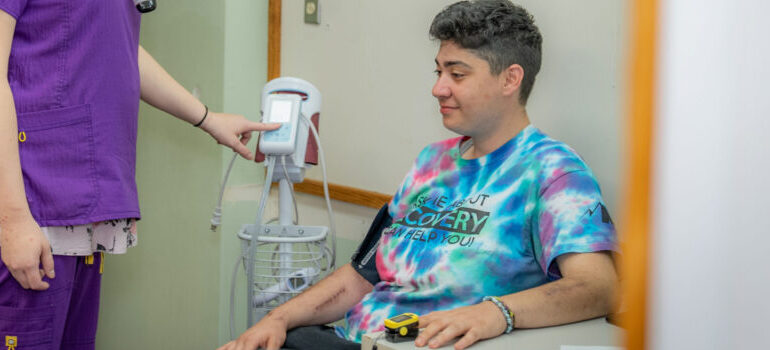Addiction Treatment
Get comprehensive and specialized addiction treatment at Harmony Ridge Recovery Center WV for lasting recovery and improved well-being.
The decision to leave substance abuse behind and start a new life is already the first sign of progress. If you’ve happened to be the one in need of addiction treatment, congratulations on your courage to seek help! If, on the other hand, your loved one is someone who needs recovery, rest assured you’re at the right address. At Harmony Ridge Recovery Center WV, we understand that it takes immense mental and emotional strength to reach out for professional help and start battling addiction. Contact us today and let us help you take back control of your life from addiction.

We Tackle Substance Abuse With Various Treatment Options and Evidence-based Therapies

At Harmony Ridge Recovery Center WV, we utilize a variety of evidence-based and holistic therapies and counseling to support individuals on their recovery journey. Cognitive Behavioral Therapy (CBT) and Dialectical Behavior Therapy (DBT) help individuals identify negative thought patterns and develop healthier coping mechanisms. Individual, family, and group therapy provide emotional support and foster strong relationships throughout the healing process. Art therapy and holistic addiction therapy encourage self-expression and overall well-being, while Motivational Interviewing and Rational Emotive Behavior Therapy (REBT) help individuals build motivation and resilience against relapse. Each approach is tailored to meet the unique needs of those seeking lasting recovery.
The Four Phases of Addiction Treatment
Substance abuse in the U.S. has reached epidemic levels, with over 20.4% of Americans developing severe drug disorders since 2020, starting as young as age 12. Yet, less than 8% seek professional help. The National Institute for Drug Abuse links this crisis to stress, trauma, and other hardships.
Here at Harmony Ridge Recovery Center WV, we care about your long-term sobriety and the full healing of the body, mind, and soul. This reason motivates us to offer help at every step of the drug and alcohol recovery process.

The path of recovery during addiction treatment is split into four distinct phases, which will include:
- Assessment – The moment patients check into one of our rehab centers, they will go through an evaluation by a team of counselors, therapists, doctors, and supporting staff. This allows us to begin building on the patient’s individualized treatment plan.
- Detoxification – Before the addiction rehab process starts, detoxification will be necessary to flush the body of any harmful substances. For some patients, the detox process could be dangerous and must be carried out by a trusted licensed treatment facility under a medical staff’s guidance.
- Rehabilitation – Flushing substances from the patient’s system is just the beginning of the overall healing process. Rehabilitation will involve getting the core issues that fuel the patient’s addiction through therapy sessions.
- Aftercare – The primary goal of aftercare is to sustain the transformation achieved during rehab. It helps ensure that the skills learned in rehab become a lasting part of everyday life.
The process from day one to the moment you leave our treatment centers will be both tough and essential to achieving the primary goal: lifetime sobriety. It’s critical that if you truly want to overcome drug or alcohol addiction, you’ll need to have a realistic and clear understanding of what to expect.
Contact Us to Get the Right Treatment
Do not allow one more day to pass when you or a loved one remains addicted to a dangerous substance. We know how overwhelming it can be to consider reaching out for addiction treatment but rest assured that by doing so, you’re making a decision that will potentially save a life.
The doors to Harmony Ridge Recovery Center WV are open to anyone struggling with substance abuse issues. You get all the help you need from the moment you contact us. Whether it’s your loved one who seeks treatment or yourself, be sure that we put our patient’s well-being first. Reach out today to get the professional care and support you deserve.
Contact Us TodayJump To Section
Begin Your Journey to Healing Here
Ask me about recovery, I can help you!
Our recovery specialists are standing by 24/7 to help you or your loved one.
Or call us: 


